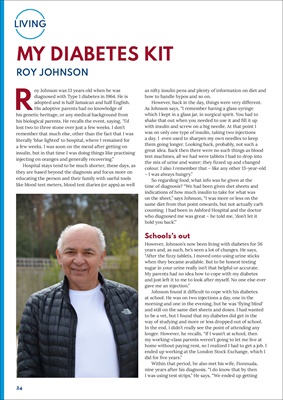
24
LIVING
MY DIABETES KIT
ROY JOHNSON
Roy Johnson was 13 years old when he was
diagnosed with Type 1 diabetes in 1964. He is
adopted and is half Jamaican and half English.
His adoptive parents had no knowledge of
his genetic heritage, or any medical background from
his biological parents. He recalls the event, saying, "I'd
lost two to three stone over just a few weeks. I don't
remember that much else, other than the fact that I was
literally 'blue lighted' to hospital, where I remained for
a few weeks. I was soon on the mend after getting on
insulin, but in that time I was doing things like practicing
injecting on oranges and generally recovering."
Hospital stays tend to be much shorter, these days, as
they are based beyond the diagnosis and focus more on
educating the person and their family with useful tools
like blood test meters, blood test diaries (or apps) as well
as nifty insulin pens and plenty of information on diet and
how to handle hypos and so on.
However, back in the day, things were very different.
As Johnson says, "I remember having a glass syringe
which I kept in a glass jar in, surgical spirit. You had to
shake that out when you needed to use it and fill it up
with insulin and screw on a big needle. At that point I
was on only one type of insulin, taking two injections
a day. I even used to sharpen my own needles to keep
them going longer. Looking back, probably, not such a
great idea. Back then there were no such things as blood
test machines, all we had were tablets I had to drop into
the mix of urine and water; they fizzed up and changed
colour. I also I remember that - like any other 13-year-old
- I was always hungry."
So regarding food, what info was he given at the
time of diagnosis? "We had been given diet sheets and
indications of how much insulin to take for what was
on the sheet," says Johnson, "I was more or less on the
same diet from that point onwards, but not actually carb
counting. I had been in Ashford Hospital and the doctor
who diagnosed me was great - he told me, 'don't let it
hold you back'."
Schools's out
However, Johnson's now been living with diabetes for 56
years and, as such, he's seen a lot of changes. He says,
"After the fizzy tablets, I moved onto using urine sticks
when they became available. But to be honest testing
sugar in your urine really isn't that helpful or accurate.
My parents had no idea how to cope with my diabetes
and just left it to me to look after myself. No one else ever
gave me an injection."
Johnson found it difficult to cope with his diabetes
at school. He was on two injections a day, one in the
morning and one in the evening, but he was 'flying blind'
and still on the same diet sheets and doses. I had wanted
to be a vet, but I found that my diabetes did get in the
way of studying and more or less dropped out of school.
In the end, I didn't really see the point of attending any
longer. However, he recalls, "If I wasn't at school, then
my working-class parents weren't going to let me live at
home without paying rent, so I realized I had to get a job. I
ended up working at the London Stock Exchange, which I
did for 10 years."
Within that period, he also met his wife, Fionnuala,
nine years after his diagnosis. "I do know that by then
I was using test strips," He says, "We ended up getting